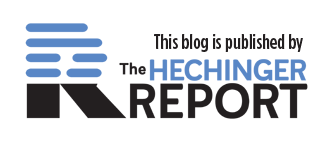Crowdsourcing was a big theme at the 2014 federal datapalooza conference devoted to education on January 15, 2014. Linked In’s Christina Allen pointed out that her company is sitting on a “large-scale data base of outcomes.” That’s because users report where the went to school and their employment history. If mined properly, the Linked In database could give high school students a sense of job prospects at different universities. Another start up, HowsMyOffer.com, asks students to voluntarily share their college financial aid offers (“the shopping sheet”). The idea is to demystify the financial aid process and shine a light on the inconsistent offers that colleges make. Yet another, Student Success Academy, is crowdsourcing high school counseling.
These ideas are brilliant, but I wonder about the veracity of self-reported data. We all know how often people lie about their education and job history. (I’d be curious to learn what the lie detection rate is at Linked In). Wouldn’t the outcomes database contain a giant amount of incorrect data?
Crowdsourcing is cheaper and easier than collecting verifiable data. It’s great for when you want people’s opinions. But I don’t think crowdsourcing is used very much in the medical field. Why does it make more sense for education?



